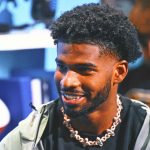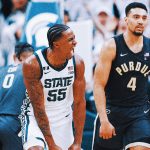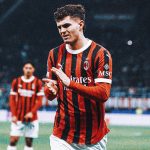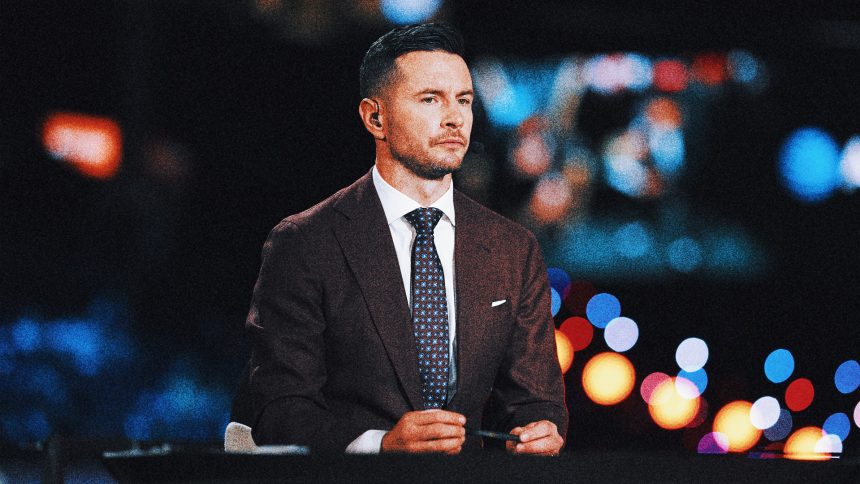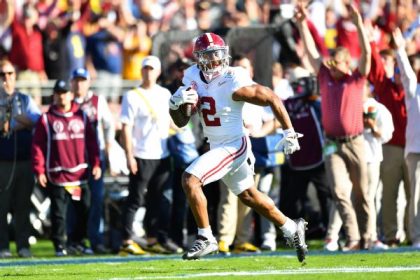The Los Angeles Lakers — winners of 17 NBA championships and the third-most valuable franchise in the league — have hired JJ Redick as their next head coach.
Redick, who had been linked to the Lakers job dating as far back as May, reportedly conducted his first official interview with Los Angeles on Saturday, just days after Dan Hurley informed the franchise of his intention to return to UConn. With Hurley out of the picture, Redick instantly became the front-runner, and reports began to surface Tuesday morning that an agreement was in place.
[Inside Dan Hurley’s decision to return to UConn]
The instantaneous thought from most has been this: With no previous coaching experience for Redick, who opted for a career in broadcasting following his retirement from the NBA in 2021, how can we properly judge him as a coach? Plus, the bigger question: Can a 39-year-old Redick handle LeBron James, Anthony Davis & Co., and will the current players respect a guy who they went up against not too long ago?
ADVERTISEMENT
If there’s anybody who can provide an in-depth perspective on that, it’s Mike Krzyzewski. The Hall of Famer coached Redick for four years at Duke, and coached James during Team USA’s gold medal runs at the 2008 and 2012 Summer Olympics.
“Make no mistake about it, he can coach,” the 77-year-old Krzyzewski told FOX Sports in an exclusive Zoom interview from the office that he still occupies at Duke. “He wants to win so badly, but he backs it up. JJ prepared as well as anybody that I ever coached.”
The ironic layer to the entire situation is that Redick has just started a weekly podcast with James titled “Mind the Game.” How will Redick manage coaching someone who’s currently his podcast co-host?
“LeBron and JJ are friends. It’s not just about being friends though,” Krzyzewski said. “You have to be partners in this, and here’s what I know: LeBron wants to win. JJ wants to win. It’s a matter of them and the people they’re with to work that out.”
Redick and James did not record a podcast last week, which added fuel to the notion that Redick would soon be named the Lakers’ next head coach.
*** *** ***
Krzyzewski and his then assistant coach Chris Collins, who since leaving Duke in 2013 has led Northwestern to its only three NCAA Tournament appearances in program history, including back-to-back trips the past two years and a win this season, knew the moment they showed up to Redick’s hometown of Roanoke, Virginia, that he was special.
Redick was a Cave Spring High School product and 2002 McDonald’s All-American Game MVP. But as much of a star as the eventual Duke all-time leading scorer was, Redick came from humble beginnings as the son of Jeanie and Ken, two avid potters, and one of five kids. He has two older twin sisters, Catie and Alyssa, who played basketball at Campbell University and gave him his nickname by repeating his original nickname of “J.” His younger brother David played football at Marshall, while his youngest sister Abigail played basketball at Virginia Tech and Drexel.
“His parents are first-class people,” Collins, who maintains a strong friendship with Redick, told FOX Sports via phone interview. “It’s wild because when we went up to do the home visit, they lived in a house on a mountain and there weren’t any street names. When they were describing to us how to get there, this was before GPS systems. They’re like, ‘when you see the big boulder, take a right and go three quarters of a mile, then there will be a road to your left.’ So we were up in the mountains, and his parents are just awesome people.
“They have the five kids, a little gravel backyard where they had their basketball hoop, and it was cool to meet them because they were so genuine. They were very humble people from the start, and very into their faith — very faithful people. You had a family of five kids and really great parents. He was brought up in such a great, loving home, so it was no mistake why he was the kind of guy he was.”
Redick came to Durham and wasted no time making an impact, averaging more than 15 points per game as a freshman and scoring 30 to lift Duke past NC State in the ACC Tournament Championship Game. It was after his sophomore season, though, following Duke’s run to the national semifinal, that Redick took his game to another stratosphere.
“The big thing with him was after his sophomore year. He would tell you that was the turning point of his career,” Collins said. “He had a good sophomore year, and we went to the 2004 Final Four, but we lost to UConn in the semifinals. They had (Ben) Gordon and (Emeka) Okafor, and all of those guys. We had a great team with Luol Deng, Shelden Williams, JJ, and Chris Duhon was a senior. But we lost in the semifinals and JJ had a turnover late in the game.
“At the end of the season, he was struggling with a lot of things because he had played well, but there was a lot of pressure on him. That’s when he became so detail-oriented with his workouts and with what he is now, with who he became as a pro and even with who he’s become as a broadcaster. I see him with his preparation for his broadcasts and his podcasts. I think that summer following his sophomore year of college was the most pivotal moment of his career because he made an unbelievable commitment to being great in everything: nutrition, rest, his workouts, his attention to detail and more. That junior year, he went from being really good as a freshman and sophomore to being national player of the year quality as a junior and senior, and being the JJ Redick he became.”
Who Redick became was a two-time consensus first-team All-American, averaging 21.8 PPG as a junior to a whopping 26.8 PPG as a senior, shooting 52% from the floor and 42% from beyond the arc in his final season, all while serving as a captain in those last two campaigns and earning ACC Player of the Year honors in each of them.
“From the very beginning, he was special,” said Mike Cragg, former senior associate athletics director at Duke and a man who spent more than three decades at the school. “He came in special, but he also had to work hard for it to get to that outstanding level that he reached. At Duke, it takes a commitment to play for Coach K, and he embodied everything about it throughout his career as much as any Duke great. He played during an era as well where he was hated as much as any player we had. So, he had to overcome those personal vendettas of playing at Duke and being that guy. And he not only overcame it. He thrived in it.”
*** *** ***
The villainous reputation Redick had at Duke, and the way he handled it, is a great lens that shows his maturity at a young age. He did not let the negative noise or narratives surrounding him as the enemy to opposing fan bases get in the way of his success. That led to him being selected No. 11 overall by the Orlando Magic in the 2006 NBA Draft and playing 15 years in the league.
If there’s anyone who knows how to get into Redick’s head and fire him up, it’s Collins, who was an assistant under Krzyzewski from 2000-2013 and is the son of four-time NBA All-Star and 2016 College Basketball Hall of Fame inductee Doug Collins. The Northwestern head coach recalled a moment from Redick that he said “speaks to his toughness and who he is.” It came in the ACC Championship Game against a tough, physical Boston College team coached by Al Skinner. Collins said the Eagles’ players were being rough with Redick, trying to get into his head.
“For whatever reason, he was being a little whiny that day,” Collins said.
Collins convinced Coach K to take Redick out of the game — a rarity — then proceeded to try to make him angry on the bench.
“Under my breath, I was saying things and doing everything in my power to get him mad,” Collins said. “I remember the one thing that really struck him was I told him he was acting like a brat. And, I said: ‘you look like a little brat out there.’ He exploded on me. He turned at me and started yelling and cursing at me. I said, ‘Coach, he’s ready to go back in the game.'”
Collins said Redick went in and nailed three 3-pointers in 90 seconds, finished with 26 points and led Duke to the win.
“That was one of my all-time favorite stories about his competitiveness and drive, his ability,” Collins said. “I think that goes hand in hand with what I’m saying: I think he’s going to be really good because his ability to relate to guys will translate.”
That relatability with players is something that even a former North Carolina Tar Heel felt when he crossed paths with Redick in the league. In the midst of Redick’s six total stops in the NBA, the shortest one came with the Milwaukee Bucks, when he was traded from Orlando ahead of the deadline and in a contract year. In Redick’s brief stint, the Bucks were the No. 8 seed in the playoffs and were swept by the Miami Heat in the first round of the playoffs. But it was then Milwaukee rookie John Henson, a 6-foot-9 forward who won two ACC Defensive Player of the Year awards en route to being selected 14th overall in the draft by the Bucks, who was trying to find his way in his rookie season.
“He came with the Bucks for the last 30 games of the season, and from my standpoint as a rookie, JJ Redick was well into his career when I got into the NBA,” said Henson, who ended up playing eight years in the league across Milwaukee, Cleveland and Detroit. “JJ’s day-to-day work ethic, demeanor, advice and knowledge was something that really stood out to me. We always used to laugh because he was one of the best shooters I had ever seen, and we had Mike Dunleavy Jr. as well. We always used to laugh and say, ‘who’s the better shooter?’ We would watch, especially as a rookie, and Dunleavy and Redick would work out and make 30 in a row. The tipping scale was JJ’s shots were always stationary and Dunleavy was always on the move, so we’d vote Dunleavy. But, that’s just how good of a shooter those guys were, and I think that’s what makes JJ special as well — his routine, his consistency.
“During the playoffs, he got benched by [Scott] Skiles during a playoff series and he was sitting outside the hotel,” Henson recalled. “He said, ‘Rook, come sit down.’ So, I went and sat next to him. He said, ‘Keep playing hard. Keep doing the right thing. This isn’t necessarily a normal situation NBA-wise.’ We had a lot of dysfunction … but he sat me down and told me to keep my head high and to work hard, to not let it affect me. That advice went a long way for me in my career, and JJ doesn’t even know that. I really appreciated that with that aspect, and I learned a lot from him by observing. He was such a leader by his actions, and the way he handled himself stood out to me. He shot before and after games, he was early to the training room every day, early to practice daily and he was just a high-level professional as a player. And he’s a great dude. He can hang with the guys, but when it’s time to buckle up, he’s one of those guys you want to be in the trenches with.”
*** *** ***
So, how will Redick, who only ended his playing career four years ago, fit as an NBA head coach? Krzyzewski was pretty candid and even offered a challenge to his former star player.
“The thing that JJ will have to do as a head coach is to let other people use their talents, and not be a micromanager, but a leader who empowers the people around him,” Krzyzewski said. “Basically, to let the people around him do what coaches let JJ do when he was playing.
“He understands the game, he understands the guys playing the game – where you have empathy for every other player – and he understands people. He develops trusting relationships with people. When he says something, there’s no BS. It’s the truth. If a player trusts you, and you can tell him the truth the whole time, you’re going to have a better player playing for you. He knows the game, he knows how to teach the game and he [will] know how to surround himself with complementary coaches. He’s smart enough to know he’s not going to do it alone, so you’re going to have not just outstanding players, but outstanding assistants. He will build a culture that’s conducive to winning and going for it on a day-to-day basis.”
Redick’s competitive nature is even felt away from basketball. For instance, on the golf course, he has put time into his game and somehow found Collins’ handicap. So, last week, Redick texted his former assistant coach at Duke because he finally matched his handicap and challenged him to play at the next available moment in their schedules.
“He wasn’t asking how I was doing or about my family. No, he was letting me know that he and I had the same golf handicap,” Collins said. “So, I’d like that match to be streamed because big brother always comes out on top. Not many people can get in his head, but I’ve still got it.”
Redick has a certain charisma that drives his competitive nature and the investment he pours into relationship-building. In terms of his interests, he has become a big wine connoisseur, with Cragg telling FOX Sports that when he went to Redick’s for dinner a couple of years ago, he was quick to bring out the glasses for tastings and share his passion with everybody at the table. (Sidenote: LeBron is also into wine.)
On the condition of anonymity, one current NBA assistant coach weighed in when asked what he thought of Redick being the head coach of the Lakers.
“I think he is extremely cerebral. He has a modern approach and eye for the game,” the assistant said. “I think he will be good from a game-planning and tactics standpoint, but I think the speed of the game as a coach is overwhelming at first. … Timeouts, challenges, scheme changes, play calling, substitutions, late game management — these are all things where you’ve got to have a strong staff around you to help cover your blind spots. He will also be surprised with the amount of decision-making outside of the games as well — practice times, walk through versus shoot around, film versus no film?”
There will be doubters surrounding Redick. Many people will question a guy who is so closely removed from playing suddenly coaching a man his age and one that he co-hosts a podcast with, LeBron James. And with the Lakers’ recent track record of six coaches since Phil Jackson was out in 2011, and none having made it past Year 3, you can argue there could have been better opportunities for Redick, and that he shouldn’t have rushed while he’s very much enjoying his TV career.
But as Krzyzewski said, that doubt is never going to depart, and Redick’s proven people wrong many times before.
“I don’t say anything to the haters because what they say doesn’t make a damn bit of difference,” Krzyzewski said. “To think any organization would hire a head coach for glamorous reasons is ridiculous. If we worry about what people say, we’d go nuts. We should only worry internally as competitors, and he’s always only worried about himself. Look at the places he’s gone as a result. I have no doubt this will be no different.”
John Fanta is a national college basketball broadcaster and writer for FOX Sports. He covers the sport in a variety of capacities, from calling games on FS1 to serving as lead host on the BIG EAST Digital Network to providing commentary on The Field of 68 Media Network. Follow him on Twitter @John_Fanta.
recommended
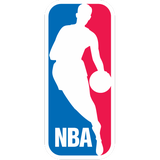
Get more from National Basketball Association Follow your favorites to get information about games, news and more



